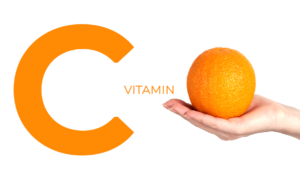Immunity Series: Vitamin C
Maintaining a strong immune system is vital to being a healthy and high performing athlete and human. We put together a series on immunity to better educate you on foods and supplements that may help improve your ability to fend off illness. While a varied, healthy diet is important, we’d be remiss to mention that exercise, stress reduction and good hand washing is also important.
What is vitamin C?
Vitamin C, also known as L-ascorbic acid, is a water soluble vitamin that is naturally present in some foods and added to others. Humans are not able to synthesize vitamin C, so it is necessary that we make it a component of our diets.
What does vitamin C do?
Vitamin C is important in immune function. Immune cells collect vitamin C and use it to protect and increase the amount of immune cells that work to kill invading organisms in your body.
In addition to immune function, vitamin C is required for our bodies to produce collagen which is an essential part of the connective tissue that helps to heal wounds and injuries. vitamin C can also assist in the absorption of non-heme iron (iron that is present in plant-based foods).
What foods contain vitamin C?
- red peppers
- strawberries
- kiwis
- oranges,
- brussel sprouts
- spinach
- green peas
- cantaloupe
- cabbage
- cauliflower
- grapefruit
- broccoli
- tomato
- guava
Should I supplement and how much should I take?
Vitamin C in foods is identical to vitamin C in supplements.
The current recommended dietary allowance (RDA) for adults is 90mg for men and 75mg for women. It is generally recommended that nutritional needs are met from food sources. Fruits, particularly citrus fruits, and vegetables are great sources of naturally occurring vitamin C.
If you choose to take a vitamin C supplement, recent studies conclude that ascorbic acid is the preferred form of supplementation because it best resembles the concentration of food sources from vitamin C. Those at risk for consuming inadequate amounts of vitamin C could include smokers, those with limited food variety and those with intestinal malabsorption or chronic disease.
Which vitamin C supplements are best?
While it’s ideal to get your vitamins from food, sometimes we need an additional boost. Some of our favorite professional grade supplement versions of vitamin C are this pill, or this chewable version.
Do you want a personalized supplement and food recommendations based on your unique needs? Visit our micronutrient testing page for more information. We’d love to help you!
How safe is vitamin C?
If consumed in high intakes, there are few negative effects of vitamin C. The most common minor side effects are diarrhea, nausea, or abdominal cramps due to unabsorbed vitamin C in the intestinal tract.
Because vitamin C enhances non-heme iron absorption, there could be a concern for increased iron absorption. Healthy individuals would likely be unaffected by this, but those who chronically over consume vitamin C could overload the iron stores in their body, leading to tissue damage. There are specified Upper Intake Levels (ULs) that apply to food and supplement sources of vitamin C. For adults, the UL of vitamin C is 2,000mg for men and women. Consuming vitamin C above the UL for an extended amount of time could lead to adverse health effects.
Bottom Line:
Vitamin C has a variety of functions in the body, including preventing cell damage and assisting our immune cells in fighting off foreign invaders that enter our immune system. It is needed to help keep our connective tissue healthy as well as aides in non-heme iron absorption. Deficiency of vitamin C is rare, but not getting enough could lead to anemia, infections and slow wound healing. Vitamin C consumption can shorten the duration that you experience the common cold, but it is unlikely that it will prevent catching the common cold.
The best way to consume vitamin C is through a well-varied diet filled with fruits and vegetables.
Want to learn more about your individual micronutrient status and nutrition needs?
Learn more about out nutrition programs here.
References:
https://lpi.oregonstate.edu/mic/health-disease/immunity-in-brief
http://edis.ifas.ufl.edu/pdffiles/FY/FY21500.pdf
https://ods.od.nih.gov/factsheets/vitaminC-HealthProfessional/#en3
Thanks to our intern Caroline Brandy, a junior at NCSU majoring in Nutrition, who is on the dance team. Her favorite vitamin C rich food is strawberries!
DISCLAIMER: The statements made on this website have not been evaluated by the FDA (U.S. Food & Drug Administration). The products linked to and sold on this website and any information published on www.TheEnduranceEdge.com are not intended to diagnose, treat, cure, or prevent any disease. The information provided by this website and/or this company and/or www.TheEnduranceEdge.com is intended to improve your health, fitness and performance. It is not a substitute for a face-to-face consultation with your healthcare provider, and should not be construed as medical advice. The entire contents of this website are based upon the opinions of our staff, unless otherwise noted.




